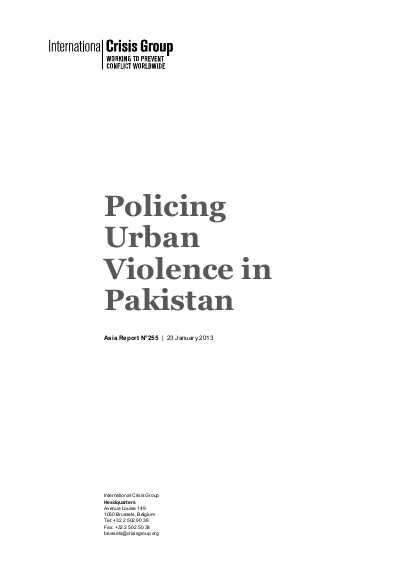
Endemic violence in Pakistan’s urban centres signifies the challenges confronting the federal and provincial governments in restoring law and order and consolidating the state’s writ. The starkest example is Karachi, which experienced its deadliest year on record in 2013, with 2,700 casualties, mostly in targeted attacks, and possibly 40 per cent of businesses fleeing the city to avoid growing extortion rackets. However, all provincial capitals as well as the national capital suffer from similar problems and threats. A national rethink of overly militarised policy against crime and militancy is required. Islamabad and the four provincial governments need to develop a coherent policy framework, rooted in providing good governance and strengthening civilian law enforcement, to tackle criminality and the jihadi threat. Until then, criminal gangs and jihadi networks will continue to wreak havoc in the country’s big cities and put its stability and still fragile democratic transition at risk. Some of the worst assaults on religious and sectarian minorities in 2013 occurred in Quetta and Peshawar, including the 10 January suicide and car bomb attack that killed over 100, mostly Shias, in Quetta; the 16 February terror attack that killed more than 80, again mostly Shias, in Quetta’s Hazara town; and the 22 September bombing of a Peshawar church that killed more than 80 people, mostly Christians. The provincial capitals of Peshawar, Quetta, Karachi and Lahore are bases of operations and financing for a range of extremist groups and criminal gangs that exploit poor governance and failing public infrastructure to establish recruitment and patronage networks. As urban populations grow, the competition over resources, including land and water, has become increasingly violent. Khyber Pakhtunkhwa (KPK)’s capital, Peshawar, and Balochistan’s capital, Quetta, are hostage to broader regional security trends. The conflict in Afghanistan and crossborder ties between Pakistan and Afghan militants have undermined stability in KPK and the Federally Administered Tribal Areas (FATA). Military-dictated counterinsurgency policies, swinging between indiscriminate force and appeasement deals with tribal militants have failed to restore the peace, and instead further empowered violent extremists. Police in Peshawar, which has borne the brunt of militant violence and where violence is at an all-time high, lack political support and resources and appear increasingly incapable of meeting the challenge. Indeed, while militants and criminals frequently target that city, the force is powerless to act when they then seek haven in bordering FATA agencies, because its jurisdiction, according to the Frontier Crimes Regulation (FCR) 1901, does not extend to these areas.
Resource collections
- UN Habitat - Urban Response Collection
- Urban Response - Urban Crisis Preparedness and Risk Reduction
- Urban Response Collection - Community Engagement and Social Cohesion
- Urban Response Collection - Economic Recovery
- Urban Response Collection - Environment and Climate Change
- Urban Response Collection - Housing, Land and Property
- Urban Response Collection - Urban Crisis Response, Recovery and Reconstruction
- Urban Response Collection - Urban Resilience